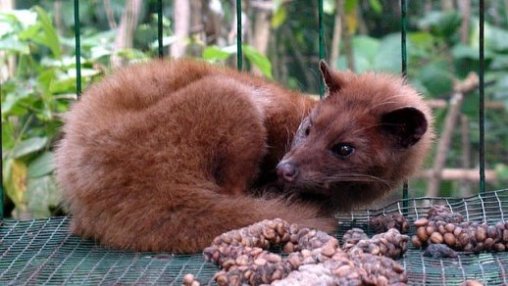In which Luke Honey manages to blag some eye-watering coffee – eye-watering, that is, both in its costliness and its method of production…
One of the amusing little perks of the food blogger’s existence are the numerous unsolicited emails you get from pushy PR companies desperate to flog you their wares. Not the emails as such, but the free things they want to send you, or the events they want you to take part in. Over the years we’ve had organic chickens dumped on our doorstep, invitations to “exclusive” Creole cook-ins, unlimited supplies of newly launched breakfast cereals, an opportunity to join a van load of “kids” to pick wild garlic in a meadow in Dorset, and the chance to appear as a studio guest on one Mr Gordon Ramsay’s “F Word” television programme. I wasn’t sure about the last invitation. I had several prolonged chats with a hyped-up production assistant who required me to be at their television studio in Camden Town the next day, dressed in black tie; at eleven o’ clock in the morning. As I’ve got a job of sorts to hold down at the Blacking Factory, and I didn’t really fancy the idea of being mistaken for a worshipful brother, I turned this golden opportunity down.
One of the better offers was from some upmarket coffee company, which volunteered, very generously, to send us a free batch of coffee beans. “You can have whatever coffee you like” they said. “Okay then” I said, “Send me some Blue Mountain!”. As you know, Jamaican Blue Mountain is one of the most famous coffees money can buy (as championed by that arbiter of elegance, Mister Bond) and it also happens to be one of the most expensive. The Blue Mountains are found between Kingston to the south of the island, and Port Antonio to the north. They rise to over seven thousand feet high. I read somewhere that the Jamaican pickers have to scale rocky outcrops to harvest the coffee, although, in truth, the coffee is grown on the misty lower slopes at about three to five thousand feet above sea level.
Another coffee of choice is Kopi Luwak or Civet Coffee. This is quite possibly the most expensive coffee in the world, with prices reaching $160 a pound. It’s produced in the most revolting and extraordinary way. Someone in Mrs Aitch’s office heard that I wrote a food blog, and offered, very kindly, to give us a sample from his private supply. It duly arrived in a jam jar- enough to make about two small petit cafés. I gave our lucky, albeit suspicious, guests the chance to sniff it at a recent dinner party. “Fruity”, “Chocolaty”, “Rich” we all agreed. Some bright spark pointed out that it looked a bit like rabbit droppings. She was more right about this than she realised. It is droppings. But it ain’t rabbit. It’s from a civet. Or more accurately the Asian Palm Civet (Paradoxurus hermaphroditus). I have to confess to you that I’m not exactly sure what a civet is: the furry critter looks a bit like a rodent-weasel cross; it may even have something to do with cats. It has a tail. Anyway, the civet munches away on coffee berries, which then pass through the digestive tract, before being “defecated” (as Wikipedia rather coyly puts it) into clumps. The droppings are collected, washed, dried in the sun and given a light roasting.
And what does it taste like? I hear you ask. Very rich in taste, utterly smooth, almost like drinking a cup of dark chocolate, surprisingly fruity, (as Her Majesty might have said), hints of strawberry. All that chemical stuff churning around in the civet’s stomach seems to have a beneficial effect on the taste of the bean, eliminating all traces of bitterness. Aesthetically, the coffee is pleasing too; thick and deeply black in colour. It was truly divine, the nectar of the gods. Recycling’s finest hour.











Very rich in taste…
Yes, I rather expect it is.
The very biggest question of all is, who was the weirdo that saw some civet poo on the ground and thought – Hmm, I wonder what would happen if I made some coffee out of that???
Worm-
I know, the very same thought occured to me too; but despite all this, civet coffee is truly delicious- it tastes amazingly like a cup of thick chocolate, it’s truly “dans le chocolat”
p.s. Many thanks for the whisky, which arrived a few days ago…
you should hear how they made the whisky….
If this coffee tastes “amazingly like a cup of thick chocolate”, I’d like to taste a hot chocolate made from chocolate beans that had passed through a civet. Could be mind-blowing.
One assumes that a latte made from the critter’s stools would in fact be a shatte and cost one turd less.
That there is comment of the month material.
“Good God waiter, this coffee tastes like it’s come straight out the arse of some sort of ferret. Well done indeed…”
My understanding is that palm civets can be tamed and kept as pets, so I wonder whether any high-end restaurants have taken to offering coffee at £150 a cup “from our own civet” or perhaps from several civets if the chef’s house is large enough. In fact a kind of civet-sommelier could take the beasts from table to table, though they might wriggle a bit, allowing diners an even more authentic experience. If you want the best coffee, first source your civet.
I recall the civet was linked to the spread of the SARS virus. So one’s coffee would also be spiced by the thrill of danger.
Oh crikey, really?
Going a bit civet crazy here. Wikipedia informs us the creature also produces an oil (or is used to produce one):
“The oil extracted from small pieces of the meat kept in linseed oil in a closed earthen pot and regularly sunned is used indigenously as a cure for scabies.”
I bet its fur would make a nice hat too.
It’s used in perfumes too. Apparently an aftershave called Jovan used to contain it. I remember this one from my youth – very musky.
Dear Sir,
i have more for civet coffee…and i come from Indonesia…if you would like to order, pliease contact our email.
I hope i can be supplly more civet coffee for you.
Regards,
Meta